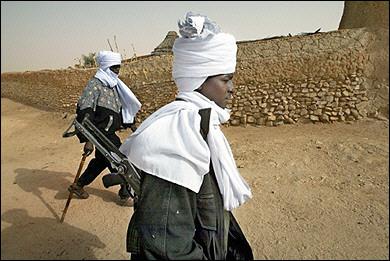Western Sudan rebels demand condemnation of Khartoum’s ‘crimes’

TINE, on the Sudan-Chad border, Jan 27 (AFP) — A senior Sudanese rebel official whose movement has been battling government forces and allied militia in the west of the country appealed to the world to halt what he called Khartoum’s “criminal action.”
“We call on the international community to stop the criminal action these people are doing,” Abubker Hamid Nour, the coordinator of the Justice and Equality Movement, told a small group of journalists in Tine, a town straddling the border between Sudan and Chad.
While Khartoum and the much larger, southern-based Sudan People’s Liberation Army inch towards a conclusion of talks in Kenya aimed at ending a separate 20-year-old war, a conflict in the west’s Darfur region has escalated into a major crisis since it flared up in February 2003.
That was when two groups took up arms to force Khartoum to reverse the perceived marginalisation of the region.
In response, the government co-opted Arab militia groups called djin-djewid to counter the uprising and mobilised regular soldiers.
At least 3,000 people have been killed and more than 100,000 Darfurians have trekked across the border into Chad, many of them wounded by bombs dropped by government planes.
The last attempt to hold negotiations, under Chadian mediation, broke down on December 16.
“We need witnesses, responsible people to attend the meeting. We don’t trust them (the government), said Nour.
“After the failure of negotiations in Abeche (a town in Chad), they started bombing severely on a daily basis,” he said, a claim backed up by a team from Medecins sans Frontieres (MSF – Doctors Without Borders which set up a clinic on the Chadian side of Tine to treat the wounded.
“Fifteen to 20 villages they are bombing every day by Antonov… The gang of Khartum is trying to kill our people,” he said.
“There is a big disaster,” he added.
Last week, Khartoum predicted that military victory in Darfur was close.
“The war in Darfur will stop in days and by then peace will be restored and life will return to normal,” President Omar al-Beshir told the official Al-Anbaa newspaper.
A couple of days later, Khartoum said it had launched a major relief operation in Darfur and state television reported that as well as trucks, a cargo plane had been filled with supplies such as food and medicine.
“What they are doing is different from what they are saying,” the rebel leader accused.
“They burn the villages, kill the cattle… They want the people to leave,” he said, sitting in a red plastic chair on the dry bed of the river that marks the frontier.
“Over the last four weeks, 2,000 people have been killed,” he said. This toll cannot be confirmed independently.
An AFP journalist in Tine witnessed planes flying over the down and dropping bombs on the Sudanese side.
“There can be no peace in Sudan without (solving) the problem in Darfur,” warned Nour, who was dressed in a djellabah and turban.
“The government neglects our people. Most of them are ignorant. There is starvation, no hospitals, people are very poor, we are living in two different countries,” he said.
“We want the unity of Sudan, an equal distribution of wealth, we want a federal system that shares power,” he explained.
Asked about JEM’s relations with another rebel group, the Sudan Liberation Movement, Nour said: “Our objectives are the same. We conduct joint military operations.”
He claimed that JEM had some 9,000 active fighters and that the SLM had 16,000.
He denied Khartoum’s claim that his movement is backed by Eritrea or that it was supported by Chad.
Chadian border guards, however, do nothing to stop rebels crossing the frontier.
Chadian President Idriss Deby is of the same ethnic group as the leaders of the two rebel groups, Zakhawa.
